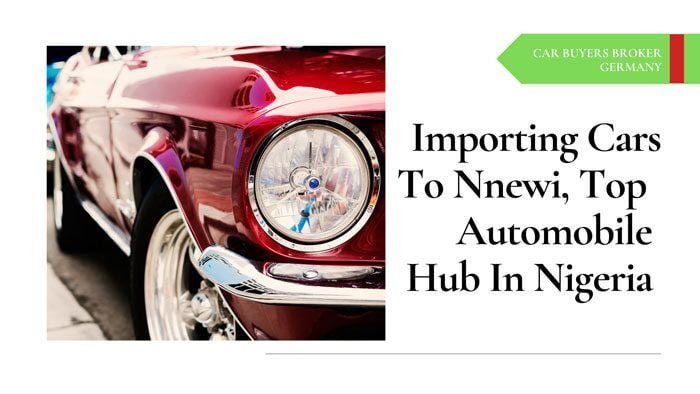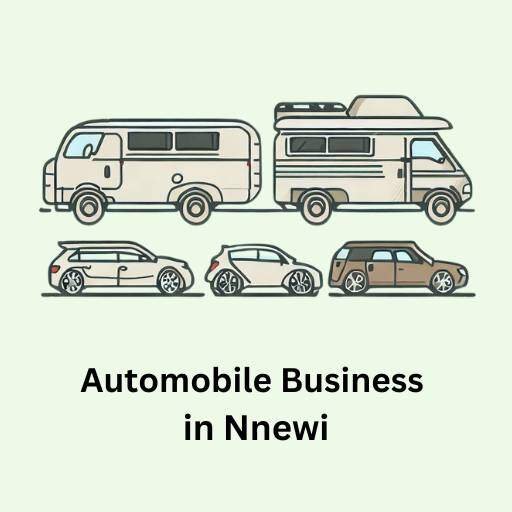Are you looking for a way to buy a quality and affordable car in Nigeria? Do you want to know how to import used cars to Nnewi from Germany? If yes, then this article is for you.
A Brief Insight Into The Background Of Nnewi
Nnewi is a town in the Anambra state in the southeastern region of Nigeria. It is the second-largest city in Anambra and has over 400,000 people.

Nnewi is a cultural and economic center for the Igbo people, who are one of the major ethnic groups in Nigeria. Some of the famous Nigerians from Nnewi are Cletus Ibeto, the founder of Ibeto Group, and Nnamdi Azikiwe, the first president of Nigeria.
One of Nigeria and Africa’s largest and most successful automobile businesses is located in Nnewi. The first indigenous car manufacturing plant in Nigeria, Innoson Vehicle Manufacturing, which produces cars, buses, trucks, and motorcycles, is hosted by Nnewi.
The town also manufactures the NASENI M1, the first motorcycle entirely made in Nigeria, powered by solar energy. Nnewi dominates up to 80% of the market for vehicle spare parts in Nigeria and beyond. Some of the country’s wealthiest and most influential auto entrepreneurs, such as Innoson Group, Cutix Cables, Chicason Group, and Ibeto Group, are produced by Nnewi.
Importing used cars to Nnewi from Germany is a lucrative and convenient option for many Nigerians, especially those in the automobile business. Germany is a reputable and reliable used car source, offering many models, features, and specifications. Germany has a solid and friendly relationship with Nigeria, with favorable trade and diplomatic policies. Importing used cars to Nnewi from Germany can save you money and time, give you quality and variety, and boost your auto business and economy.
In this article, we will explain how to import used cars to Nnewi from Germany, why Nigerians purchase used cars more, and the benefits and challenges of importing used cars to Nnewi from Germany. We will also provide some tips and advice on how to import used cars to Nnewi from Germany successfully and safely.
Automobile Business in Nnewi
Nnewi is a leading city in the auto industry in Nigeria and Africa. Nnewi has a long history and tradition of automobile business, dating back to the early 20th century when Sir Louis Odumegwu Ojukwu, the first Igbo man to own and drive a car, established a transport company in the town.
Since then, Nnewi has become a hub for auto trading and innovation, producing some of the country’s most successful and influential auto entrepreneurs.

Innoson: Nigeria’s Indigenous Auto Pioneer
One of Nnewi’s achievements and innovations in the auto sector is hosting the first indigenous car manufacturing plant in Nigeria, Innoson Vehicle Manufacturing (IVM). In 2007, Innocent Chukwuma, a native of Nnewi, founded IVM after starting his business as a spare parts dealer. The company produces cars, buses, trucks, and motorcycles designed and built to suit the Nigerian and African terrain and climate. Its vehicles are also exported to other African countries, such as Ghana, Sierra Leone, and Mali.
NASENI M1: Nigeria’s First Solar Motorcycle
Another achievement and innovation of Nnewi in the auto sector is manufacturing the first motorcycle entirely made in Nigeria, NASENI M1. NASENI M1 was developed by the National Agency for Science and Engineering Infrastructure (NASENI) in collaboration with the Federal University of Technology, Owerri (FUTO), and the Scientific Equipment Development Institute (SEDI), Nnewi. NASENI M1 is powered by solar energy, has a speed of 70 km/h, and a range of 50 km.
Nigeria’s Auto Parts Powerhouse
The sales and supply of vehicle spare parts in Nigeria and beyond are dominated by Nnewi, which controls up to 80% of the market. Various auto parts and accessories, such as engines, tires, batteries, filters, brakes, lights, etc., are dealt with by over 3,000 shops and warehouses in Nnewi. The automotive hub also has many small and medium-scale enterprises (SMEs) that manufacture car and motorcycle spare parts, such as Omatha Automotive Products Ltd, which produces auto filters and exhaust pipes.
Imported Used Cars Boost Nnewi’s Auto Business
Importing used cars from Germany contributes to the growth and development of the auto business in Nnewi. A steady supply of quality and affordable vehicles for the local market is provided by this business, which increases the demand and sales of auto parts and services. Employment opportunities for the local people, such as mechanics, drivers, dealers, and agents involved in the importation, clearance, transportation, and maintenance of used cars, are also created. Furthermore, the reputation and competitiveness of Nnewi as a hub for auto trading and innovation are enhanced, attracting more customers and investors from within and outside Nigeria.

Why Nigerians Purchase Used Vehicles More
It is no longer news that Nigerians purchase used cars more than new ones. According to a report by the United Nations Environment Programme (UNEP), Nigeria is the world’s third-highest importer of used cars, after the United Arab Emirates and Mexico. Nigeria is also the highest importer of used cars in Africa, accounting for 40% of the total imports in the continent.
There are many reasons why Nigerians prefer to buy used cars over new ones, such as:
Affordable Used Cars in Nigeria
Used cars are cheaper and more accessible than new ones. The average price of a new vehicle in Nigeria is about N15 million, which is beyond the reach of most Nigerians. On the other hand, the average cost of a used car in Nigeria is about N3 million, which is more affordable and realistic for many Nigerians. Moreover, there are more options and sources of used cars in Nigeria, such as online platforms, dealers, brokers, and auctions, than new vehicles, which authorized distributors and manufacturers mainly sell.
Longevity of Maintained Used Cars
Used cars can last long and perform well if properly maintained and serviced. Contrary to the popular belief that used cars are old and faulty, many used cars imported to Nigeria are in good condition and have low mileage. Some of them are even newer than the locally assembled cars, which often need to be updated and overpriced. With regular maintenance and servicing, used cars can last years and offer satisfactory performance and efficiency.
Variety in Used Car Options
Used cars offer more variety and choice regarding models, features, and specifications. Nigerians have diverse tastes and preferences regarding cars, and used vehicles can cater to them better than new cars. Used cars come in different models, features, and specifications, from luxury to economy, sedans to SUVs, and diesel to electric. Nigerians can choose the vehicle that suits their needs, budget, and style without being limited by the availability and affordability of new cars.
Customization of Used Cars
Used cars can be easily customized and modified to suit the needs and preferences of the owners. Nigerians love to personalize their vehicles and make them stand out from the crowd. Used cars offer more flexibility and freedom for customization and modification than new cars, which are often restricted by warranty and regulations. Nigerians can change their used cars’ color, design, accessories, and parts to make them more comfortable, attractive, and functional.
However, buying used cars also comes with some challenges and risks, such as:
Hidden Faults in Used Cars
Used cars may have hidden faults or damages requiring costly repairs or replacements. Some used vehicles imported to Nigeria are not inspected or tested before shipment and may have mechanical, electrical, or structural problems that are not visible or noticeable at first glance. These problems may affect the used cars’ performance, safety, and durability and may require expensive repairs or replacements in the future.
Legal Issues with Used Cars
Used cars may have legal or ethical issues, such as stolen, smuggled, or counterfeit vehicles. Some used cars imported to Nigeria must be cleared or documented correctly and may have been stolen, smuggled, or counterfeited in their countries of origin or transit. These vehicles may pose legal or ethical problems for the buyers, who may face prosecution, confiscation, or penalty if caught by the authorities. Moreover, these vehicles may also contribute to crime, corruption, and environmental degradation in Nigeria and abroad.
Environmental Impact of Used Cars
Used cars may have environmental or health impacts, such as higher emissions or lower safety standards. Some used vehicles imported to Nigeria are not compliant with the environmental or health standards of Nigeria or the international community and may emit more pollutants or consume more fuel than acceptable levels. These vehicles may harm the environment and people’s health and increase dependence on fossil fuels and foreign exchange.
Safety Concerns in Used Cars
Furthermore, some used cars imported to Nigeria may need to meet the safety standards of Nigeria or the international community and may have defective or missing features, such as airbags, seatbelts, or brakes. These vehicles may endanger the lives and well-being of drivers, passengers, and pedestrians and may also increase the rate of road accidents and fatalities in Nigeria.
These challenges and risks can be overcome by importing used cars from Germany—a reputable and reliable used vehicle source with strict quality and safety regulations.
How to Import Used Cars to Nnewi from Germany
If you want to import used cars to Nnewi from Germany, you should follow these steps and procedures:
Search for a trustworthy seller and inspect the car’s history and condition. Get the required documents, such as proof of ownership, export permit, and customs clearance. Organize the shipping and transportation of the car to Nigeria. Register the vehicle in Nnewi and pay the relevant taxes and fees.

Selecting Used Cars in Germany
Find a trustworthy dealer or auto broker in Germany who can help you select, inspect, and purchase a used car. You can use online platforms to find reputable and reliable dealers or brokers offering you a wide range of used cars from Germany at competitive prices. You can also use online tools to check the history and condition of the used car before you buy it.
Understanding Import Regulations
Check the customs regulations and restrictions on the importation of the used car, such as the age, condition, and value of the vehicle. You can use online resources to find the duty, levy, VAT, and other charges to import the used car to Nigeria. You can also use online calculators to estimate the total cost of importing the used car to Nigeria.
Arranging Car Shipping to Nigeria
Arrange the shipping and delivery of the used car to the nearest seaport in Nigeria, such as Lagos, Port Harcourt, or Calabar. You can use online services to find the best shipping and delivery options for your used car from Germany to Nigeria. You can also use online trackers to monitor the status and location of your used car during the shipping and delivery process.
Hiring a Clearing Agent
Hire a genuine clearing agent who can help you with the clearance, documentation, and taxation of the used car at the seaport. You can use online directories to find and contact licensed and experienced clearing agents who can handle the importation of your used car to Nigeria. You can also use online reviews, such as clearingagentreviews.com, to check the reputation and feedback of the clearing agents you are considering.
Transporting Car to Nnewi
Transport the used car from the seaport to your desired location in Nnewi, either by road or rail. You can use online platforms, such as [transportify.com], to find and book the best transportation and handling options for your used car from the seaport to Nnewi. You can also use online maps, such as google.com/maps, to plan the best route and time for your transportation and handling of your used car to Nnewi.
Conclusion
Bringing pre-owned vehicles from Germany to Nnewi emerges as a pioneering and lucrative choice for numerous Nigerians, particularly those in the automotive industry. Importing used cars to Nnewi from Germany offers cost and time savings. It provides access to superior quality and a diverse range of vehicles, ultimately enhancing both the automotive business and the local economy. Nevertheless, this endeavor has challenges and risks, including concealed defects, legal complications, and potential environmental impacts.
Therefore, you must follow the steps and procedures of importing used cars to Nnewi from Germany, such as finding a trustworthy dealer, checking the customs regulations, arranging the shipping and delivery, hiring a genuine clearing agent, and transporting the used car to Nnewi. You also need to follow some tips and advice on how to import used cars to Nnewi from Germany successfully and safely, such as doing thorough research, verifying the authenticity, negotiating the best deal, inspecting and testing the used car, and maintaining and servicing the used car regularly.
We hope this article has helped you understand how to import used cars to Nnewi from Germany, why Nigerians purchase used cars more, and the benefits and challenges of importing used cars to Nnewi from Germany. If you have any questions or comments, please feel free to contact us or comment below. Thank you for reading, and happy importing!
